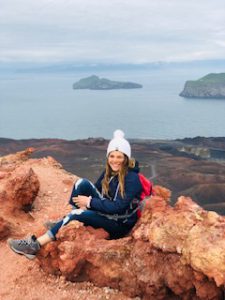By Katrina Rossos
Tasha Desiderio, a University of Florida senior majoring in animal science and minoring in zoology, traveled all the way to Iceland to conduct field research with Earthwatch Institute, helping their scientists collect data in conjunction with orca conservation.
Desiderio said the most memorable experience of the trip was her first day out on the water—the sounds of waves crashing and birds flying above. The conditions were perfect for whale watching, according to the boat captain, but nothing. Finally, the team spots several pods of orcas and they begin to collect and record data. “I stood in awe of how the scientists worked so efficiently together on the boat,” Desiderio said. “I looked around and we were surrounded by killer whales. They came up and bumped the group. We saw all types of orcas ranging from adults to calves and male to female. I remember a group of three calves following our boat, playing, and making vocal sounds. I felt like I was in a movie. I had to keep reminding myself that it was really happening.”

Originally from Jupiter, Florida, Desiderio has recently applied to veterinary school to become a wildlife veterinarian. However, she wanted to work in the field to get a sense of what wildlife conservation truly means and entails. “I love animals, and I really appreciate the environment,” she said. “It is one thing that truly unites us all and it gives us everything we need to survive, so it is crucial to maintain its balance and respect it. I believe that learning about ecology and wildlife is the perfect way to do that!”
Desiderio discovered Earthwatch’s citizen research opportunity online. She wanted to find an opportunity to work abroad in a conservation capacity. “I had never heard of citizen research until I found Earthwatch. They offer programs worldwide involving a variety of different conservation efforts,” Desiderio explained. “I chose the ‘Killer Whales and Their Prey’ project in Iceland because I always wanted to travel to Europe, especially Iceland, and I am interested in working more with marine animals, specifically mammals.”
The head scientists on the project split up the citizen scientists into two groups: a boat team and a land station team, and the teams alternated each day. On the days they were on the boat, Desiderio said they took out small boats and used binoculars to spot orca pods. When they did locate orcas, they would record observations about the mammals’ behavior, other animals in the area, and the weather. Additionally, the team took biopsies from the dorsal fin of the orca for genetic testing, and they also took sardine samples for prey testing. Additionally, the team would take pictures of the orcas and their dorsal fin for identification purposes and recorded audio of the orcas’ vocals with a hydrophone, Desiderio explained.

“On land station days, we headed to the top of a cliff and set up binoculars and other research equipment. We recorded all animals, terrestrial and aquatic, that we observed,” she said. “On the days when the weather was not conducive to working in the field, we analyzed the data. We used specialized software to organize orca vocalizations into categories and folders. We also collected all the dorsal fin photos and compared them to other whales in the database and identified them.”
Furthermore, Desiderio and the team were able to learn about orca health, history, and conservation through several presentations showcased to the team so that they could better understand the animals they were helping to conserve.
Beyond learning about the scientific methods like data collection and analysis of photographs and vocals, Desiderio said the experience taught her about travel, collaborating with people from different backgrounds, and how to adapt to another’s country’s culture. Moreover, Desiderio noted that now has a more comprehensive view of how challenging conservation efforts can be.
“This field work confirmed my love for conservation and endangered species,” she said. “It made me realize that I am very interested in working with marine mammals.”
 0
0
